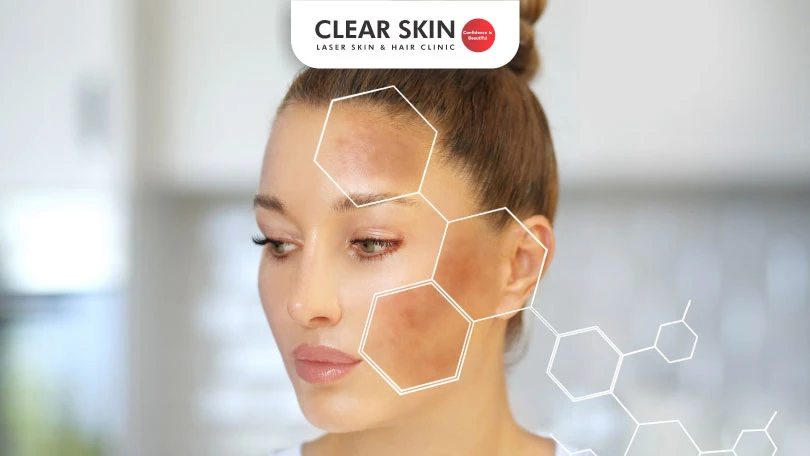Reviewed By:
Category: Melasma
Melasma is a common skin condition characterized by blotchy, brownish facial pigmentation, more prevalent in women aged 20 to 40 with darker skin types. It’s triggered by factors like sun exposure, pregnancy, and hormonal treatments. Treatment involves topical creams, chemical peels, and sometimes lasers, tailored to each patient’s skin type and pigmentation levels for optimal results.

Table Of Content
- What is the Best Treatment for Melasma?
- How does Chemical Peel work for Pigmentation?
- Conclusion
What is Best Treatment for Melasma?
Melasma is a very common skin pigmentation. This usually appears as asymmetrical, blotchy, brownish colored facial pigmentation. This condition is more common in females than males. This pigmentation usually starts between the age of 20 to 40, but can also begin in childhood also. It is more common in people having type 3 and 4 skin type, who gets easily tanned after exposure to the sun. Continuous sun exposure causes deposition of pigment in dermis & this often persist long-term. Many of the patients have a family history of Melasma.
Etiology of melasma is very complex. The pigmentation is mainly due to overproduction of melanin by the pigment cells, melanocytes. Melasma can of various type Epidermal, Dermal or Mixed.
- Epidermal melasma has a well-defined border & it is in dark brown color. This melasma responds very good to the line of treatment.
- Dermal Melasma, located in the dermis of skin & has il defined borders. This pigment is light brown or bluish in color. Being deeply seated, it responds poorly to the treatment.
- Mixed Melasma, this is the commonest type having Light brown, dark brown, bluish pigmentation on the skin. This improves partially with the treatment.
Triggers for melasma:- There are various factors which may trigger the melasma & make it more worst. These include
- Continuous sun exposure without sun protection
- During pregnancy
- Intake of oral contraceptive pills
- Progesterone pills.
- Intrauterine device
- Hypothyroidism.
This complex etiology of melasma leads to unsatisfactory results after treatment in some cases. General treatment measures include discontinuation of hormonal treatment, Use of broad-spectrum sunscreen along with physical protection with sun coat, scarf, wide-brimmed hat should be used.
How does Chemical Peel work for Pigmentation?
Topical treatment includes the use of creams containing Azelaic acid, Kojic acid, Vitamin C, Tranexamic acid. Creams containing skin lightening agents like arbutin, deoxyarbutin can be tried. Nowadays various vascular lasers are also tried which also gives better results.
Treatment of Melasma is individualized. Every patient of melasma needs to be treated differently depending upon a level of pigment & type of skin. Multiple treatment modalities should be used to get the best outcome rather than monotherapy. Even with combination treatment approach, few patients get good improvement, while other get better. However, we recommend patients to take treatment to improve the pigmentation & make it more stable.
Conclusion
Popular Q&As
If you’re dealing with black scars on your legs, it’s likely due to conditions like folliculitis caused by ingrown hairs from waxing. Laser hair removal offers a permanent solution by destroying hair follicles, reducing future ingrown hairs. Curious about acne treatment costs in Pune? Learn about laser treatments, session prices, influencing factors, and insurance tips. Do you know what causes pimples on the chest and back? Click to Know more
How to Remove Black Scars on legs?
Unlocking the Secrets of Acne Treatment Costs in Pune: Your Go-To Guide!
Understanding and Managing Chest and Back Acne
We Got Your Back! Ask Us Anything On Your Mind!
Reach out to us on
Didn’t Find What You Were Looking?
Please Contact Us.
We are committed not only to treating you, but also educating you.

